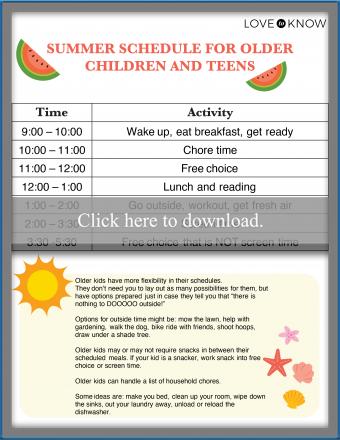
Summer is creeping up on you fast. A break from the school runs, the sports practices, and the homework and projects can not get here quick enough. While summer break is exciting and certainly something most people look forward to, the season can be daunting for parents who will suddenly have the kids home 24 hours a day, seven days a week. You need a summer schedule for the kids. You need a few schedules. Order and expectations are key to your summer survival.
Summer Schedules for Kids Will Save You
When you hear the term "summer schedule," you might roll your eyes and groan, one more thing that you have to do! No, no-no. The summer schedule is your friend. It is your ally when it comes to creating rule and order in the kingdom that is your home. These simple tools let children know who reigns Queen of this castle and what they can expect within the summer day. There are a ton of benefits to maintaining a summer schedule for children.

Summer Schedules Lessen Anxiety
Kids generally thrive with some structure and routine in their lives. They like to know what is coming down the pipes at them. Having a summer schedule allows your children to prepare for their summer days. Knowing what to expect can help them feel safe and secure, comfortable, and grounded. When they feel all of these things, they can focus their energy on creativity and exploration of ideas.
Summer Schedules Get Kids Prepared for the School Transition
When kids leave traditional school settings, they are likely already programmed to follow some schedule and routine. The summer routine keeps their brains in schedule mode. They learn to organize their time, their thinking and look forward to what comes next. Keeping some summer schedule helps children ease back into the rigors of traditional school come fall.
Summer Schedules Provide Time for Connectivity
Summer days drag on, and without schedules, 2 p.m. can feel like 10 p.m. Everyone starts fighting and annoying one another, and before you know it, your entire family is mastering the art of avoiding one another. Summer schedules allow families to enjoy the times that they come together. Using schedules enables you to work in quiet, alone time and make the most of other blocks of time. A half an hour of midday reading means cuddles and a story. Family movie time after dinner is when everyone can put down their devices, their toys, and their chores and just be together. Friday outings are something that everyone will start to look forward to. Having this type of activity scheduled will help parents get everything work-related done so that they can focus on family and fun within this planned space. Build blocks of time into summer schedules that help maintain family connections and foster family bonds.

They Can Give Kids Something To Look Forward To
If you create boring and monotonous schedules, you will probably receive plenty of kickbacks from your bored little minions. Work in a few fun activities or themes so that your family has something to look forward to on the schedule. You can schedule in Fun Fridays, where everyone drops what they are doing and heads out of the house. Hold PJ days, Take-Out Tuesdays, Wacky Science Wednesday, or anything else that you think your kids will enjoy and that will motivate them to stick to an itinerary.
Using Your Summer Schedule
The only way that any schedule becomes useful is through consistency. Don't spend time creating one and explaining it to your family just to let it all slide by day three. You are the ringleader of this little circus you created, and you have to make sure that the summer schedule gets followed.
Why Schedules Fail
Not all schedules end up surviving the summer. Some carefully set summer schedules fail or never quite catch on. This can happen for several reasons. When you know the common reasons for failure, you can work to avoid them in your own summer scheduling practices.
- No consistency - When schedules are made but not kept, consistency crumbles and schedules tank. You have to keep up with what you create. Younger kids will learn the art of time management from your ability to manage schedules and transition from activity to activity.
- Over-scheduled - If you try to pack your schedule so tightly that it begins to resemble boot camp, it won't last for long. Kids' summer schedules are frameworks for fun and order. Over-scheduling will cause burnout, frustration, and exhaustion, none of which you need in your busy life.
- Choosing the wrong activities - When you work activities into your schedule, keep your kids' interests in mind. Packing a schedule full of academics and activities that they will dread isn't going to work in your favor. Just because your schedule looks Pinterest-perfect doesn't mean that it will end up being functional.
Ways To Keep On Schedule
Keeping to the schedule you decide on is clearly crucial to its success. The question is, how exactly do you do that when you are working, juggling household chores and responsibilities, and so much more?
- Set a timer. Once you transition to another activity, set a timer to go off ten minutes before the new activity wraps up. Announce to kids that they have ten minutes to wrap up and clean up. Move onto the next part of the summer agenda.
- Create scheduled activities that won't bring you to your knees. While over-scheduling can ruin the fun for everyone, so can trying to go too big. If you know that building a volcano in the middle of a Tuesday will make you cry, then DO NOT DO IT.
- Make sure you build in "me time." Get up early before the kids wake up and get a jog in or read a book. Have your coffee, take a shower, make yourself feel a little human. Put kids to bed at a decent hour so that you have a bit of space in the day to decompress. Knowing that the day includes blocks of time just for you will help you to stick with the schedule even when you don't feel like it.
- Designate an assistant. If you have an older child or two, make them the assistant for the week. Offer a few perks to being your assistant and put them in charge of reminding you when a schedule activity is due for a switch. They can also help with the preparation of meals or craft setup.
Summer Schedules Are Not Set in Stone
Summer schedules are there to make life easier, not harder, so make sure that whichever schedule you choose to go with works with your life and your needs. Sure, you should think of the kids and what works best for them. For example, don't schedule outings at 3 p.m. if you know that your little darlings turn into gremlins around that time. Make sure to schedule around your needs too.

Schedules Can Kill Two Birds With One Stone
If you know that you have meetings at 10 a.m., then schedule screen time around then. If you know that you are dragging by 4 p.m. and you need to sit down and relax for a minute before the dinner rush begins, make that part of the day a mandatory quiet time in your bedroom. Just because the days get stretched in the summer, and the sunlight lingers late into the evening doesn't mean that you have to let the kids stay up late. If you are done with all the mom-ming by 8 p.m., then that is bedtime. Read them a story, kiss them goodnight, and leave a bit of time in the evening for you.
Some Rules Can Be Broken
Summer schedules can be more relaxed, and sometimes it's okay to break the rules and go rogue. If your schedule says that the family eats lunch at noon, but you want to head out to the lake a bit later and have a picnic, that's fine. Things are not always set in stone. Everyone will survive if the routine gets shifted around and activities get bumped. Remember, summer schedules are meant to create a framework for expectation and structure so that you don't lose your mind somewhere in the hundred days of summer. You are master of the schedule, so if you want to move things around now and again, or sneak a fun activity into the schedule later in the week, then go on with your bad self. This teaches kids that while structure is essential, so is flexibility. Balance is everything.
Scheduling Around Kids of All Ages
If your family has young children and older children, a one size fits all schedule might not be the best route. You might need to use a few different schedules to keep your ship from sinking. The good news here is that older kids can easily follow their own schedules. Think of all that they manage to keep track of during their school day, and they do that without you by their side! Have a schedule for younger children that includes several activities and shorter periods of time allotted to each summer activity. Older kids and teenagers might have a more general schedule with longer space between activities as well as more choices available to them, but they should also have a summer schedule or framework to function under; otherwise, they will never leave the basement or stop binge-watching Grey's Anatomy.
If you have a large family that includes children of varying ages, consider having everyone give input regarding what to include in the summer schedule. Sit the family down and create a summer bucket list. Write down all the activities that family members want to do and then work many of those into the schedule. This will give children ownership of their days and will provide them with something to look forward to.

Know When To Call It Quits
Creating and maintaining a summer schedule or two is a great idea. They work for so many families, keeping everyone comfortable and on task. If you find that your summer schedule just is not doing the trick for your gang, ditch it. Sometimes even the best-laid plans crash and burn. There is nothing wrong with tossing your schedule, taking a breath, and trying a different approach. Maybe you need to rework some schedule elements, perhaps scheduling by the hour doesn't vibe with your workday, or maybe your kids would do better in a couple of all-day summer camps. No one knows your tribe better than you, so you decide what works and what doesn't.







